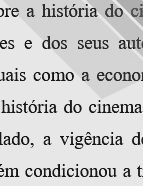

................................
As a collaborator in several periodicals, he was noteworthy for his study of the pioneers, and was rightly considered the main historian of the beginnings of Portuguese cinema. His various works popularised the "founder" of Portuguese cinema, Aurélio da Paz dos Reis, and other pioneering figures such as Pinto Moreira and Ernesto de Albuquerque. His fundamental work, published by the Cinemateca Portuguesa, Para a História do Cinema Português [Towards a History of Portuguese Cinema] (1991), was a lengthy and useful piece on the founding periods of Portuguese cinema, containing unpublished data on the emergence of the cinematograph in the archipelagos of Madeira and the Azores.
From the 1980s onwards, due to the essential driving force of Luís de Pina and his team of collaborators at the Cinemateca Portuguesa, a considerable surge was seen in the historiographical production of cinematography. Dividing its attention among the organisation of retrospectives of Portuguese cinema, the coordination of catalogues dedicated to directors and actors, the promotion of monographs on precursory figures, the stimulation of the study of the main historical moments and aesthetic movements and the history of the institution itself, the Cinemateca Portuguesa quickly became the main centre of editorial production of Portuguese cinema, with dozens of publications.
One of the Cinemateca's collaborators who contributed greatly to the advance of research in the history of Portuguese cinema was José de Matos-Cruz, under whom two pivotal works were published: O Cais do Olhar [The Quay of Vision] (IPC, 1981; a "revised, updated, corrected and enlarged" re-edition, Cinemateca Portuguesa, 1999) and Prontuário do Cinema Português [Portuguese Cinema Handbook], 1896-1989 (Cinemateca Portuguesa, 1989). Marking the culmination of several years of exhaustive laboratorial research, these two works sought to initiate the accomplishment of an ambitious Encyclopaedia of Portuguese Cinema and were part of a remarkable film inventory effort that included the research of "published bibliography, press in general, specialised journals, censorship records, catalogues, programmes, private studies, multiple files of several organisations, laboratories and companies, lists of the main archives, film library editions, thousands of loose documents - of Portuguese or foreign origin, covering the more than nine decades under study - in addition to personal contacts and testimonies" (Matos-Cruz, José de, Prontuário... , 1989, p. 5).
